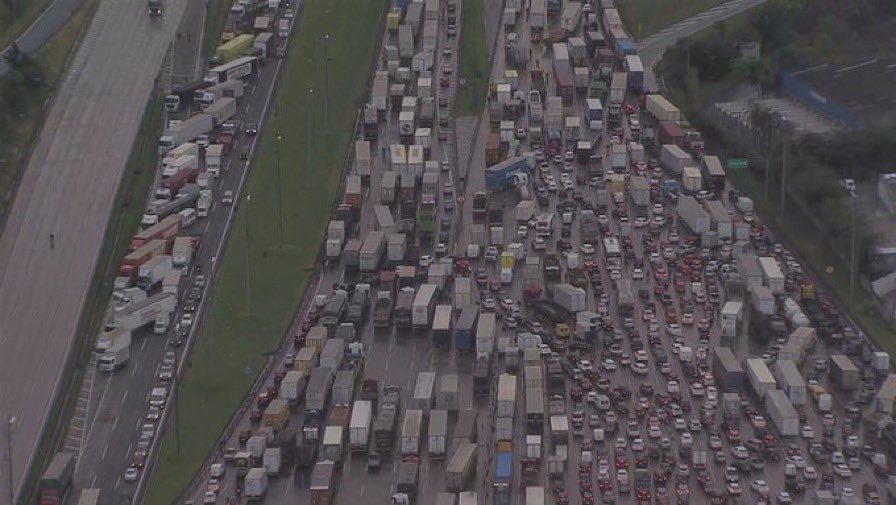
Twitter page of Ian Bremmer
Protests have erupted across Brazil following a close election on October 30th that declared Lula da Silva, or simply ‘Lula’ as he is commonly known, the winner over incumbent Jair Bolsonaro.
In the run-off election, far-left Lula had garnered 50.9% of the votes against conservative Bolsonaro’s 49.1%, according to the official count. While many international leaders, including U.S. President Joe Biden, have congratulated Lula, Bolsonaro has made no public statement since the results were announced, neither conceding the election nor challenging the results.
Lula served as president from 2003 to 2010 and was convicted of corruption in 2018, serving prison time.
Many Brazilians are convinced the election results are invalid and are making their voices heard. The protests started soon after election results were announced, led by supporters of Bolsonaro. They have blocked roads using trucks, agricultural machinery, cranes, and burning tires, and identify themselves through their attire: green shirts stamped with the Basilian flag evocative of support for the current president.
The BBC reports that by Monday night, the federal highway police reported 342 roadblocks. Many of the blockages are affecting food supply chains between the Amazonian region, which is the agricultural heart of the country, and the southeast, where the major metropolitan centres such as Rio de Janeiro and Sao Paulo are located. Videos posted to social media show protestors supported by the military, helping them to cut fences to establish blockades.
Lula’s support is mostly limited to the northeastern region of the country, while Bolsonaro has wide support throughout the country, particularly among the middle and working classes.
Observers close to the situation have told the European Conservative that the support for Bolsonaro is clear on the streets, citing the example of street vendors only offering merchandise related to Bolsonaro. They say the situation in the country is extremely tense, possibly on the verge of open conflict or even civil war, though Bolsonaro’s supporters appear to be waiting to see what his next move will be.
O Exército estão nas Ruas! pic.twitter.com/PiUIXKGwUZ
— INSTA:@Favela Caiu no Face (@favelacaiunofa1) November 1, 2022
The country’s military is aligned with Bolsonaro while the police are aligned with the left-leaning supreme court and Lula, who appointed most of the courts’ 11 members.
On Monday, Supreme Court judge Alexandre de Moraes ordered the police to disperse the roadblocks immediately and warned that all those still blocking the roads on Tuesday would each be fined 100,000 Brazilian reals ($19,300) per hour, the BBC reports.
The Movimiento Sem Teto (movement of the landless), a left-aligned group considered terrorists by some, has stated that it will clear the roads if necessary, a scenario that could easily lead to open violence.
YouTube Brasil also announced that it was blocking all material related to protests or contesting the election results.
Brazil’s supreme court has long been known for censoring social media content critical of the country’s political Left. Last September, discontent with the supreme court led to protests in several parts of the country that brought millions of ordinary Brazilians into the streets. They were protesting both the censorship by the supreme court and the use of electronic voting machines in elections, observers explained. Following the protests, Bolsonaro signed an agreement with the supreme court for reforms, but the court never followed through on them. International pressure has led to the use of electronic voting machines in this year’s elections.
Though Bolsonaro maintained the use of electronic voting machines for this election, he put in place a monitoring system including three private companies and military specialists, observers contacted by the European Conservative said. They added that though nothing has been announced publicly yet, election fraud was detected that would give Bolsonaro the opportunity to open an investigation.
They also noted that the Brazilian constitution includes a clause that allows the military to intervene after 72 hours of widespread protests, but the military must request permission to intervene. Should it do so, Bolsonaro, still acting president, would be able to send the military to defend protestors and it would solidify his popular support. The 72-hour point is Wednesday evening.
Observers fear that the country is on the verge of civil war and explain Bolsonaro’s silence as the envisioning of his next move in the face of an extremely difficult situation.
